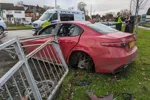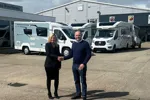Pendragon
Turnover £4.54 billion (2016)
Profit before tax £75.4 million (2016)
Franchises: (Evans Halshaw division) Citroën, DS, Ford, Honda, Hyundai, Kia, Nissan, Peugeot, Renault/Dacia, Seat, Vauxhall
(Stratstone division) Aston Martin, BMW/Mini, Ferrari, Harley Davidson, Jaguar, Land Rover, Mercedes-Benz/Smart, Morgan, Porsche, Rolls-Royce
Number of staff 9,700

The future of motor retailing will be shaped by emerging technology, so carmakers and franchised dealers will need to adapt fast.
When AM catches up with Pendragon chief executive Trevor Finn, the role of technology and innovation seems to be a recurring theme.
The last time we met at the group’s Annesley headquarters, Finn spoke about some of the scale benefits that software was providing, such as call management solutions that identified the customer before staff even answered the call, and remote access security systems which alerted staff at HQ and enabled them to immediately access CCTV cameras at any of its sites nationwide and alert police or security contractors if required.
This time, it is the digitalisation of the industry that takes up much of his thoughts. And he said the stock market-listed dealer group was “changing” from the company that spent the first decade of this millennium buying up major rivals such as Reg Vardy and CD Brammall, and which prior to the 2008 recession had a portfolio of around 300 dealerships.
It currently has about 185 franchised dealerships in the UK and its focus is more on organic growth – it has bought little in the past five years, except Leeds BMW and Mini in 2011, and three Jaguar sites plus Hyundai Newcastle and Leeds in 2016.
Used car sales and aftersales are a huge opportunity for the business, and its own software business, Pinewood Technologies, is playing a vital part. Although Pendragon’s reign as the UK’s largest dealer group ended after 19 years at the top when Sytner Group expanded this year, its strategy to double used car revenues by 2021 looks likely to restore it to the throne.
Finn remained guarded about giving away the detail, and said the whole group is working on hundreds of small improvements, with teams in each area of focus. Its management team has emphasised that if something being trialled is to fail, it needs to fail fast and try something else.
Investing in innovation
Pendragon does not see its role as a driver of dramatic change in the motor industry.
“I think we’d like to be a fast follower,” said Finn. The group’s corporate website is less modest, however, proclaiming that it is “leading the change in the automotive online retail sector” in response to changing customer needs.
Certainly, the group has been pretty innovative of late. Its Evans Halshaw mainstream brand division launched a Sell Your Car initiative during 2014 in response to the success of WeBuyAnyCar, which guarantees to better the latter’s online valuation.
It launched Move Me Closer in 2015, a service that allows online consumers to select any vehicle from the group’s 21,000-strong used car and LCV stock and have it moved to their nearest group dealership for a £200 refundable reservation fee.
Later that year, it began a programme of opening 40 Evans Halshaw Car Stores, used car supermarkets that fill in the group’s geographic gaps in order to give it a better national footprint. Each participates in Move Me Closer, thereby providing Pendragon with a UK network of car handover points ready for when online car-buying takes off. As well as displaying several hundred cars ranging from £3,000 to £30,000, each Car Store has technology to allow customers to search a ‘virtual store’ of the whole group’s stock.
It also offers an Evans Halshaw price guarantee, which promises to refund the difference if a buyer finds a similar car cheaper at another dealer within 40 miles within five days of purchasing.
Finn said Car Store’s role is to compete strongly with independents, and take a sizeable chunk of the UK’s used car market, which is about three times the size of the new car market.
“The margins are better than new cars. The level of investment is lower. So you invest less, make more, and it’s a bigger market opportunity,” he said.
“The used car market is massive, and nobody is big in it, including ourselves. So it’s still a very diverse pond to fish in.”
Pendragon has told the stock market that it aims to double its used car revenues by 2022, from the £1.9 billion turnover it recorded in 2016 from 159,000 used vehicles.
The group’s main source of stock is sales-generated part-exchanges, plus the leasing industry, including its own Pendragon Vehicle Management operation, and auctions.
“There’s a spectrum which you have to have because you want the diversity of stock,” said Finn.
The group also wants growth in aftersales, which should follow naturally from rising used car sales – Car Store sites have service workshops as well as forecourts – due to the benefits brought in by service plans, online booking and vehicle health checks. It has already launched a campaign to recruit 300 extra technicians.
Finn said online service booking, with a consumer web portal truly connected to the Pinnacle dealer management system, is an example of the benefits of owning Pinewood Technologies. Finn also pointed out that whereas video health checks have grown in popularity lately, Pinewood enabled it a decade ago, and Pendragon salespeople were interacting with customers through video 15 years ago.
More recently, the system has incorporated SMS ‘push’ notifications, which are sent automatically to a customer’s smartphone to keep them informed of how their car’s service is progressing and when it will be ready.
“We used to receive 1.2m calls a year into our contact centre asking the same question: ‘Is my car ready?’.”
Finn said each call cost “maybe 30p”, but that was not the only drawback of such a system:“It’s inconvenient for customers. So we spoke to the guys in Pinewood.”
Their solution was inspired by pizza company Domino’s, whose app keeps a customer updated on when their pizza is made, cooked and on the way to them.
“Pinewood is a different business (to dealers). It has its own culture, which we encourage, because its people are software people, and we have 20 nationalities there. Having a bunch of people who look at the world differently, but who are part of the team, is a huge advantage. We can ask a question about something we have no knowledge of, and get an answer from somebody who is on our side,” said Finn.
Pinewood has almost 25% of the UK’s DMS market, but its growth potential is limited for two reasons – the dominance of market leader CDK Global, and the reluctance of some dealers to use it simply because it is owned by a rival group.
Pendragon believes there are more opportunities overseas for Pinewood. It announced its intention to explore them last year and won a contract to supply a commercial vehicle dealer group in the Netherlands. It has also gained contracts in Germany and Finn has hosted visits from Chinese dealers.
Making technology meaningful
Pendragon wants technology to make motor retail more efficient, and Finn concedes that generally there are moves towards the online retailing of new cars. However, he warned that the industry must not waste resources on technology that is not meaningful or lacks a defined purpose.
“Technology is more and more of a driver and an enabler, but if customers don’t actually want a lot of what is served up, they will choose only what they want and we won’t make them come round to our way of thinking.
“A lot of people use ‘monster’ deployment of systems. The NHS tried to do it and failed miserably. If a major piece of software takes a certain period of time to deliver, it never gets done, because by the time you’ve got to where you thought the objective was, your objective has moved because the world has changed. Something that’s a plausible objective today has to be constantly re-evaluated.
“That applies to a lot of things. When you want to change this or that, you have to constantly change your expectations and aspirations at the same time.”
Despite its technological success, Pendragon’s financial investment is still heaviest in traditional areas – people and property. Finn said dealers under-invest in technology relative to the value they can get from it.
He believes it is difficult for the automotive industry to change, and that while car plants and component manufacturers have taken out a level of cost by improving their efficiency, car dealerships have not really moved on that much.
“All that is competitive force. The industry has had a boom for five years, maybe eight, and therefore that covers up a lot of cracks,” Finn added. He agreed that another economic crisis would be a catalyst for an efficiency drive in motor retail.
The reality, he said, is that more and more of the workforce needs to be digitally minded, which is simply a reflection of how customers and the ways they communicate have changed.
 Finn said dealer groups must work hard to stay current, to engage people, whether customers or staff. Some of Pendragon’s teams have set up groups on the
Finn said dealer groups must work hard to stay current, to engage people, whether customers or staff. Some of Pendragon’s teams have set up groups on the
WhatsApp messaging service to run and communicate sales incentives.
“It’s obvious, isn’t it? But it wouldn’t necessarily be obvious to people who are not into that,” he added.
The Car Store business allows Pendragon to “make the rules up yourself”, Finn said, and develop a more flexible business model. Its trading hours are slightly longer than a franchised dealership, it offers servicing appointments all weekend, and its stocking policy has fewer constraints.
Considering the future for franchised dealers, Finn said there is now a comparable diversity of business models that was missing in the past. Some are still centred around products, others are experiences, and some brands are trying new channels – Fiat selling cars on Amazon in Italy is one example – while others still build to order and sell through a very traditional model.
“It’s good in the sense that, if there is fundamental change taking place, it shouldn’t have to be somebody from outside the industry to make that happen. The best chance of delivering that is probably with someone inside the industry.”
“Ultimately, the economics of it all have to work because a dealer that doesn’t make any money isn’t going to be around very long. You’ve only so many opportunities to make money, and if it’s new vehicles, used vehicles, service and repair, any one of those being throttled off means you haven’t got a dealer.”
Change ‘is business as usual’
Asked whether franchised dealer profitability is under threat – from manufacturers turning the taps off or regulation increasing the costs of doing business – Finn questioned if there has ever been a time dealer profitability was not under threat.
“You could start off every year with a list of how it’s tough. You could have rates going up, the apprentice levy coming in, minimum wages coming in, threat of this and that, and you start with ‘X’ on your bottom line every year as a result. In a way, mitigating the cost of change is just a piece of business as usual,” he said.
A benefit of a business the size of Pendragon is having resources to apply to new threats – such as GDPR, which it has been tackling early. Yet Finn suggested small independents have their own advantages, including the notional option of non-compliance and hoping they don’t get caught.
“Being big, it’s just business as usual every year. So is regulation more and more burdensome? I don’t think so. You just have to get geared up and resourced to do what you have to do. If it’s something that’s expensive you can amortise that over the network.”
He believes a business the size of Pendragon has inherent checks and controls to minimise bad practice that may not be present in a small independent.
“In an independent, bad practice can be the practice,” he said.
Cultures and mega-corps – Finn’s view of business
Finn believes cultures – emphasising the plural – apply in business, but questions what the point of defining a company culture is if it does not benefit customers. He said it is fair that companies want their workers to feel proud to associate with different levels within the business – their department, their dealership, their division and the group as a whole.
 “People used to talk about a need to wear a badge so they know who they work for, and that’s a ridiculous concept. In a business sense, a lot of the culture wells up from different pieces of the whole, and in our set-up we have lots of cultures, different sub-sets which are shaped by what they do and who the group is made up of. Obviously, leadership sets a tone, but you can get a very strong culture in its own right from pieces of the business.
“People used to talk about a need to wear a badge so they know who they work for, and that’s a ridiculous concept. In a business sense, a lot of the culture wells up from different pieces of the whole, and in our set-up we have lots of cultures, different sub-sets which are shaped by what they do and who the group is made up of. Obviously, leadership sets a tone, but you can get a very strong culture in its own right from pieces of the business.
“You can have elements of being tribal. It’s okay. People will choose what they want to be associated with. Everybody gravitates towards success, don’t they?”
He admires how a business such as Google can remain so dominant without losing sight of its customers. “Because they are so powerful they could make it difficult for people to get what they want, because what are the alternatives? But they are still continuously customer-focused.
“You can’t be because you’d gift them everything.
“Being commercial, you’re able to serve your customers. But you can get to the point where you lose sight of the fact that it’s about your customers.”
“You’ve got to respect some of these mega-corps that can trade with small companies without crushing them. But as a business they’re in a different league.”
Finn said one of the biggest obstacles to putting customers first is the industry’s target- and incentive-driven model of reward and recognition. Yet dealers mirror that model with their own staff’s pay plans, to drive a behaviour that they say is not adding any value, “because if we’re going to get forced, then we have to force our people”. He said taking a different route is impossible in many respects, because the industry is so trapped in short-termism.
















Login to comment
Comments
No comments have been made yet.